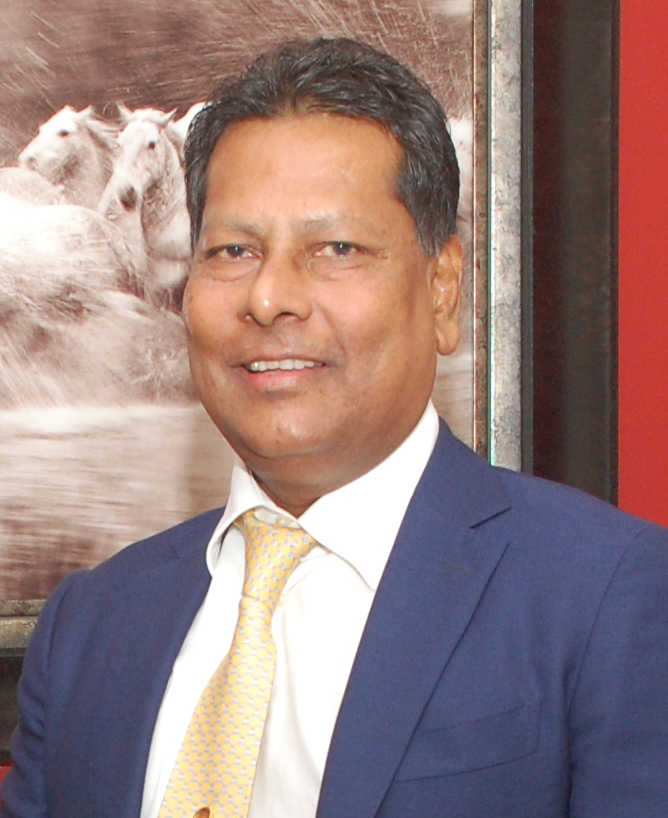Every Guyanese would own shares in a national oil company established to manage revenue from the sale of Guyana’s oil under a Change Guyana government, the party’s Presidential Candidate, hotelier Robert Badal, has said.
Badal and his prime ministerial candidate, chartered accountant Nigel Hinds, held a press conference yesterday during which the pair outlined the party’s policy regarding the management of Guyana’s expected take from oil production.
“Every citizen of Guyana would be assigned shares in the national oil company from birth. Such shares would appreciate in value with every auction, and every signing bonus,” Badal said, while adding that these shares would only be disposed of to one’s family or the national oil company.
Badal also said that Change Guyana would vest all unassigned oil blocks in a state-owned oil company, and that all blocks for which investors’ commitments under current and future contracts are not satisfied would be returned to state ownership and vested in the state-owned company. Several stakeholders have argued that oil companies, in breach of their contracts with government, have failed to develop some of the blocks they have been issued licences for.
Badal says that his party’s approach would prevent oil companies from speculating regarding the exploration and development of Guyana’s oil blocks.
He also said that “contracts governing these blocks would be royalty-based, with investors subjected to local taxes just like local companies.”
“Blocks would be auctioned periodically, let’s say annually, to realise the highest price with attractive signing bonuses. No US$18 million anymore”, promised Badal, referencing the sharply criticized bonus secured by the A Partnership for National Unity+Alliance For Change (APNU+AFC) coalition government from its contract with Esso Exploration & Production Guyana Limited, Exxon Mobil’s affiliate in Guyana.
Spending oil revenue
Badal explained that his party’s planned expenditure of oil revenue would occur in two phases or periods.
He said that from 2020 to 2022, revenues from oil would be used to increase the income levels of all employed persons through the reduction of income taxes, improvements in health care and education, and the execution of urgently needed infrastructural works, including the construction of the long-awaited new bridge across the Demerara River.
Explaining his party’s rationale, Badal said that “our approach is that there are so much urgent things to do right now that we can’t just put it as APNU and the [Peoples’ Progressive Party Civic] PPP is saying, put it in the Sovereign Wealth Fund. We have to address those immediate needs of Guyanese currently”.
The coalition government plans to direct funds from oil revenue to the Natural Resources Fund from the first sale.
Badal said that oil revenue would start to be added to the Sovereign Wealth Fund from 2023, after what he describes as urgent needs have been addressed.
“2023 onward we will activate the sovereign wealth fund as more investments are made…and more millions of barrels come online”, the businessman said, adding that “a portion of annual revenue from the sale of oil will be added to the sovereign fund every year.”
Badal also said that aside from a Sovereign Wealth Fund, other specific funds would be established.
“A portion of revenue from sales would be added to specific funds, including a Poverty Alleviation Fund, an Infrastructural Development Fund, a Health Care Fund, an Education Fund, and an Agriculture and Industrial Development Fund,” Badal shared. He said that under his government, Parliament, as opposed to any one minister, will have the power to authorise the flow of funds from oil revenues to these specific funds.
Badal also spoke of plans to establish a Welfare Fund, which he said would “be made to finance a safety net for depressed communities, single parents, and the more vulnerable in society”.
Regarding control of these specific funds, Badal said they will be managed by the Minister of Finance, as they would have already been appropriated by Parliament.
Regarding the management of the Sovereign Wealth Fund, Badal said that any expenditure from this fund would need parliamentary approval, as he believes that “this would ensure better panning, transparency, accountability and the best safeguard to peoples’ interests.”
Under the Natural Resources Fund Act, passed by the coalition government, the finance minister has deep, sweeping powers regarding the fund, despite the existence of provisions and other mechanisms created to ensure transparency and accountability.
Sustainable development
Noting that oil is a finite resource, Badal said that revenue from oil would also be used to bring hydropower on stream, while improving the effectiveness of Guyana’s manufacturing, industrial, and other sectors, and revolutionising the architecture of roads, buildings, telecommunications, and other infrastructure.
This approach, he said, is aimed at ensuring that Guyana continues to ensure economic prosperity long after oil is depleted.
Reiterating that Change Guyana would move to renegotiate all oil and gas contracts, Badal said that a government led by him would achieve this renegotiation by employing the skills which he has used to become, and remain successful in business.
Asked what options he would take if oil companies refuse to yield to his attempts at renegotiating the contracts, Badal noted that many of the terms of the contract with Esso are considered to be unfair, and he said that there are principles and laws which can void terms of a contract, or the entire contract, if they are found to be unfair or unreasonable. For this to be done, however, legal action would have to be taken.






